
Do you know the advantages and disadvantages of a native, a hybrid and a web app? And even more importantly, do you know which is right for your business?
Looking for answers to these questions? Find them in this post. The GooApps team has been helping companies develop their custom apps for over 10 years. Our specialists can advise you on the app that best suits your needs and possibilities.
A web app is a web page with interactivity that seeks to resemble that of a mobile application. It can work in different browsers, such as Chrome or Safari, and is programmed in HTML5 and/or JavaScript.
14/09/2022

A web app is a web page with interactivity that seeks to resemble that of a mobile application. It can work in different browsers, such as Chrome or Safari, and is programmed in HTML5 and/or JavaScript.
The most important advantage of a web app is its price, as it involves much less development time than the other options. The downside of these apps is that they are often slow, unintuitive, and inaccessible through the App Store or Google Play. On the other hand, having the web app icon automatically installed on the device’s home screen is a very tedious process. As a result, it isn’t easy to have a constant reminder to use it.
A Progressive Web App is an application based on a web page, incorporating some functionalities that make it more similar to a native app, such as integrating push notifications for Android, working offline, or being installed on the home screen of the phone or tablet. It is a good option when our objective is to create a version of our website adapted to mobile devices.
One of the main advantages of a progressive web app over a web app or a web page is that they provide a better user experience, as they are faster, more intuitive and can be downloaded to the homepage of the device. Another significant advantage is that it is much easier and cheaper to develop and maintain than a native application.
The main disadvantages of a progressive web app compared to a native app are that they have a poorer user experience and consume more battery power. On the other hand, they do not allow the integration of certain device functions, such as access to Bluetooth, NFC, or advanced camera controls.
Want to know more about the advantages and disadvantages of progressive web apps? Just read this other article on our blog.
A hybrid app combines features of both native apps and web apps. It can be downloaded through the App Store and Google Play as a native app and integrate operating system functionality. On the other hand, just like a web app, it can also be supported by different web technologies.
The core of a hybrid app is typically written in a specific language, usually HTML, CSS and PHP. This core is then used to compile different versions unique to each device where the application will be used.
One of the advantages of a hybrid app is that it is usually easier and faster to develop than a native app and requires less maintenance. This directly affects the cost of developing a hybrid application compared to a native one.
While it is true that in the past, hybrid apps had the disadvantages of slower speed and a poorer user experience (UX) compared to hybrid apps, in recent years, this has changed completely. With the third generation of hybrid apps (Cross-platform Native), the application’s performance is no longer affected, and the user experience is the same as in a native app.
Want to know more about the advantages and disadvantages of hybrid apps? Just read this other article on our blog.
A native app is the type of application that comes to mind when we think of those we download from the App Store or Google Play. Its main difference from a web and a mobile app is that it is developed for a specific operating system. For example, Android apps are programmed in Java, while iOS apps are programmed in Swift and Objective-C. There are also other operating systems, such as Windows Phone, for those apps programmed in C++ and JavaScript.
In the past, the main advantages of developing a native app were that we achieved the fastest possible speed and user experience and did not necessarily require a web connection for it to work.
Nowadays, the development frameworks for third-generation hybrid and progressive web apps have matured to such an extent that very few cases require the development of native apps, given their high development and maintenance costs.
The Reconstructive Microsurgery European School (RMEs), part of Universitat Autònoma de Barcelona (UAB), is widely recognised as the best Medical School in Spain, according to the European Commission.
This School needed to offer e-learning services to its students, allowing them to learn from anywhere, in a personalised way and guided by professional instructors.
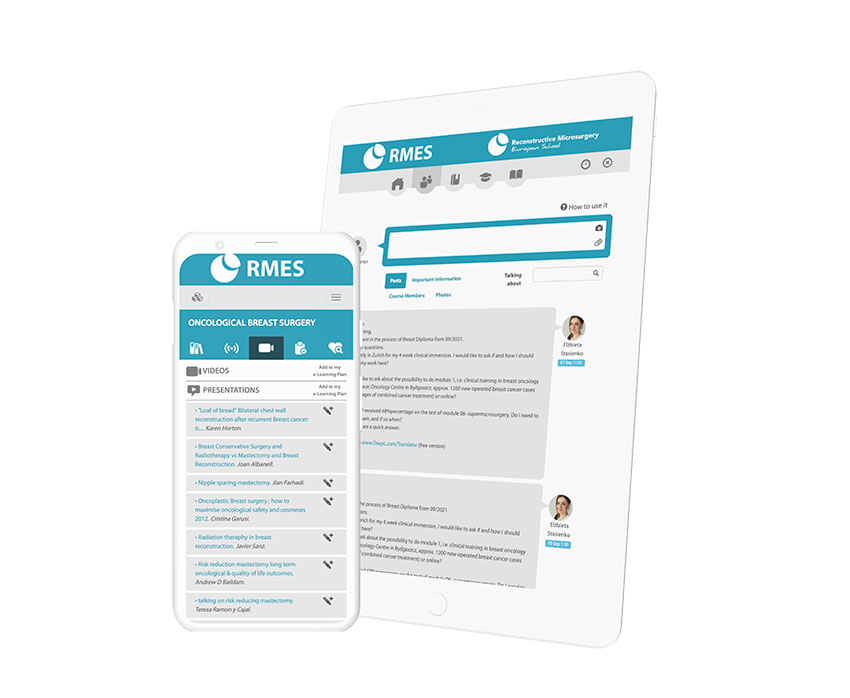
GooApps developed an innovative web app which allows students of different specialities and masters to be trained, being part of their own experience and participating in experimental procedures. This web app, available for mobiles and browsers, has enabled UAB to provide its students with a creative, innovative and accessible learning environment.
The Hospital Universitario Gregorio Marañón, located in Madrid, is an organisation with more than 400 years of history and a staff of more than 7500 professionals. They needed to quickly monitor the budget spent in each area and department of the hospital to manage their resources efficiently.
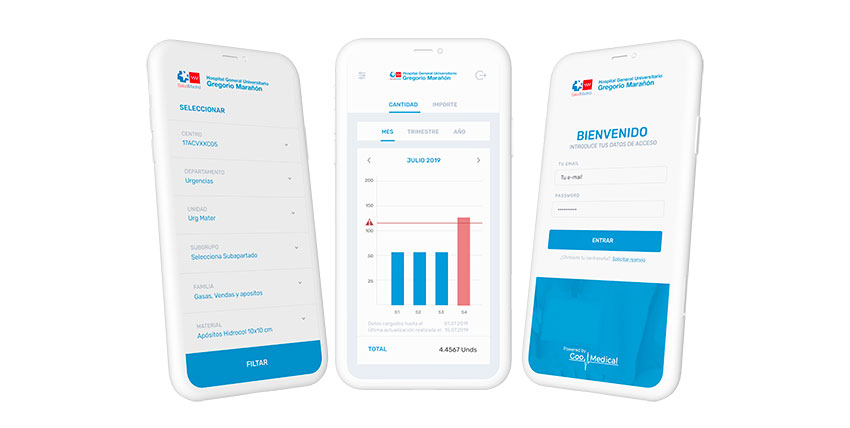
GooApps developed a hybrid app for cost control, resource optimisation and anomaly detection in a fast and user-friendly way. This tool has become key and indispensable for the hospital.
ThyssenKrupp is an international leading company with more than 100,000 employees, in different business areas, including TK Elevator, a leader in the manufacture and distribution of lifts.
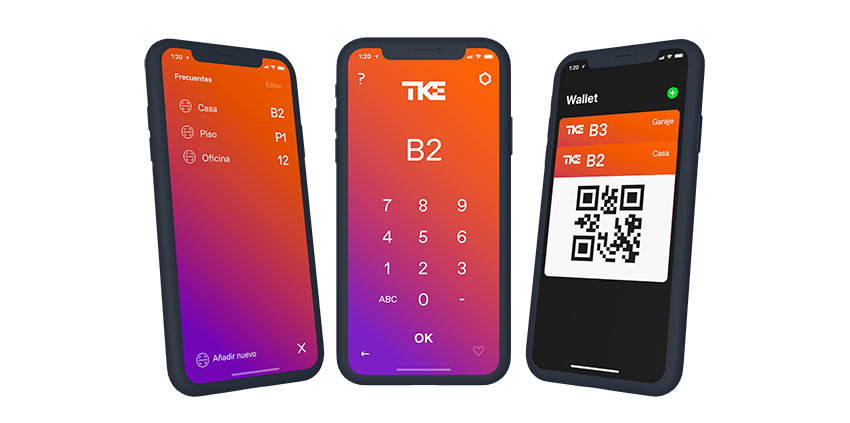
Amid the health crisis, ThyssenKrupp needed to provide a safe working environment and sought solutions to reduce the risk of infection and the spread of COVID-19. They aimed to develop a system for calling and interacting with their lifts to eliminate the need to press physical buttons, thus avoiding sources of contagion.
GooApps developed TK Elevator Pass, a hybrid app based on NFC contactless technology, which allows users to call and interact with lifts without pressing any buttons. Thanks to this app, germ spreading was successfully prevented, and the safety of people using the lifts was increased.la cual permite a los usuarios llamar e interactuar con los ascensores sin la necesidad de pulsar ningún botón. Gracias a esta app, se consiguió evitar la propagación de gérmenes y se aumentó la seguridad de los usuarios que utilizaron los ascensores.
We often come into contact with strangers. And sometimes, unknowingly, we are left alone with people we don’t know. This contact could lead to a dangerous situation where a person feels threatened and has no recourse.
Prisus aimed to develop a native app to provide security to a person in danger at any given moment and who needs to report their situation.
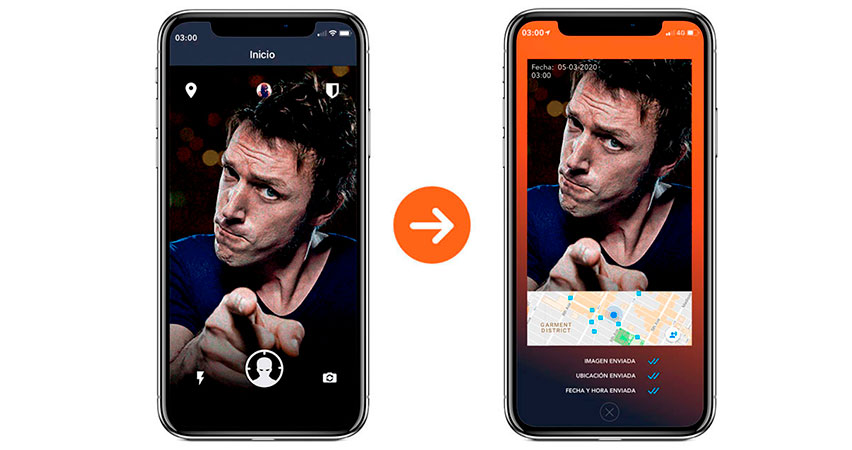
The Prisus native app allows a person in a threatening situation to take a photo of the person they are with, including location, date and time, and send it to a previously chosen contact.
Understanding the differences between these types of apps is essential to choose the right one for your business. Native apps, web apps and hybrid apps all have their advantages and disadvantages, and the final decision will depend almost entirely on the needs of your business.
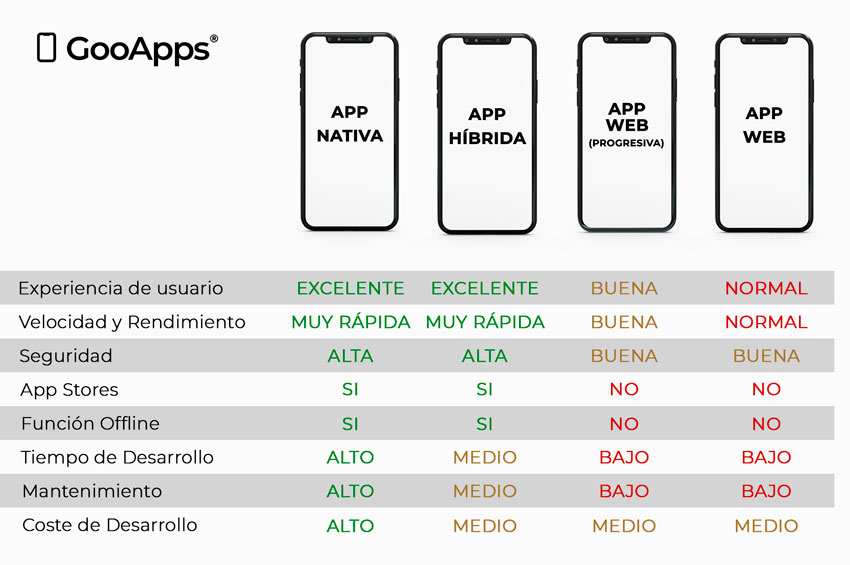
Apart from understanding the main differences between these options, we should also ask ourselves the following questions:
To develop a custom app, it will be essential to work with app developers who can help you answer these questions and advise you on the most suitable application to meet your needs. This way, you can launch your idea into the real world efficiently and practically. Outsourcing the development of apps is an excellent way to successfully carry out the project without the cost and operational burden of hiring internal staff. This entry will give you more ideas on choosing the right agency to develop your business app.
At GooApps, the best programmers nationwide will help you to develop a custom app for your business. You will always have the future option to internalise the development and maintenance of your custom app developed by GooApps.
Complete the form and GooApps® will help you find the best solution for your organization. We will contact you very soon!